Search in documentation
Alternative platforms
Did you know that more than 35% of the world’s websites are powered by WordPress? While popular, it’s not without its limitations. If you’re ready to explore other options and are looking for a change, then this article is for you. Here we examine some interesting alternatives to WordPress, designed with the desire for innovation in mind.
Are you an aspiring web developer or content creator who needs a platform to publish your ideas? Or maybe you’re part of an organization that wants its own website but doesn’t have the technical skills. There are plenty of great CMS (content management system) solutions out there, like WordPress – but if you’re looking for something different and unique, then read on! We present five innovative WordPress alternatives worth considering: Joomla!, Drupal, Squarespace and Wix.
Each of these platforms has its own strengths and weaknesses, so let’s take a closer look at them one by one. Whether you want an easy-to-use interface or sophisticated customization capabilities, our guide will help you find the perfect fit for your project. Get ready to enter the exciting world of CMS software beyond WordPress!
WordPress disadvantages
It’s no secret that WordPress is the most popular content management system (CMS) in use today. But it’s not without its drawbacks. For many users, there are times when an alternative solution may be more appropriate, such as for a large project or when specific features are required.
One potential drawback to using WordPress is its lack of scalability. While this can easily be worked around by using additional plugins, if you plan on having thousands of visitors each day, these additional plugins could cause performance issues and slow loading times. Additionally, some businesses require secure hosting and custom coding, which cannot always be accommodated with WordPress due to the platform’s limited technical capabilities.
WordPress is the most popular system for website development, but it still has some drawbacks. In this video from IdeaSpot you will learn about 5 weaknesses of WordPress.
The complexity of setting up a website with WordPress must also be considered; from choosing themes and plugins to understanding how all the elements fit together can make the process difficult for those unfamiliar with web development. Finding developers capable of doing complex work on the platform can also be expensive or time-consuming, depending on your budget and timeline.
So while WordPress has huge advantages over other CMS solutions, it’s not always the right fit for every situation – so it’s worth exploring alternatives.
WordPress alternatives
The digital age has opened up a world of possibilities for those looking for something new. Gone are the days when you had to settle for one specific solution; now there are a number of alternatives that offer exciting and innovative possibilities. Today, let’s take a look at the different types of WordPress alternatives out there.
It can be daunting to be faced with so many choices-but it doesn’t have to be! By taking some time to review each option, you can determine which alternative best suits your needs. Whether you’re looking for more customization options, a more user-friendly interface, or better security features, these are all things to consider before making a decision.
In this video from ODi Productions, you will learn what the main drawbacks of the WordPress platform are and what your options are in terms of alternatives.
So what does this mean? Ultimately, it means that there’s no “one size fits all” approach when it comes to web hosting solutions. By carefully researching and comparing different WordPress alternatives, you’ll be able to find the perfect platform for your project without sacrificing any potential benefits. And that’s why exploring the different types of WordPress alternatives is so important… to ensure that you make an informed choice about which option will work best for your website or blog. From here, we’ll explore Squarespace as another viable alternative…
Squarespace
For those who want to innovate, Squarespace offers a beautiful escape from the complexities of WordPress. Its intuitive interface welcomes anyone with an idea and creates a platform to explore their creativity. From its simple drag-and-drop page-building tools to its customizable designs, Squarespace empowers people to create without limits.

Squarespace’s features are designed for entrepreneurs who want to build brands quickly and effectively. They offer comprehensive marketing features like SEO optimization and email campaigns that can be tailored to your needs. Plus, they have built-in analytics so you can track the success of your site in real time.
But that’s not all – Squarespace also offers top-notch customer service via live chat, phone, or email support 24/7 depending on your plan. With all of these benefits, it is no wonder that Squarespace is becoming increasingly popular among web creators looking for alternatives to WordPress! As we move on to our next topic about Wix, let’s take a moment to appreciate how far we’ve come thanks to this amazing CMS (content management system).
Wix
Wix is a shining star in the world of website building. Its modern and intuitive platform gives anyone the power to create their own digital masterpiece, while keeping things simple enough to ensure that even beginners can join in on the fun. It’s as if Wix was built with innovation at its core – it encourages creativity and allows users to express themselves through their websites like no other platform can.

Wix’s flexibility allows for virtually any type of content imaginable. From blogs and portfolios to business sites and eCommerce stores, it’s all possible within one unified system; there are also over 500 designer-made templates available so you don’t have to start from scratch if you don’t want to.
But what really stands out about this site builder is its drag-and-drop editor, which makes customizing your pages almost effortless. As with most platforms today, mobile optimization is included, so your visitors will be able to view your site perfectly no matter what device they’re using.
The combination of powerful technology and design freedom has allowed Wix to become one of the most popular WordPress alternatives around – every day thousands of people use it to build their online presence… bringing them closer to achieving their goals without any technical skills whatsoever! Now on to Weebly…
Weebly
Weebly is an innovative website building platform that can help you create your own personal online presence. It’s easy to use and suitable for people with all levels of technical expertise, from novice web designers to experienced developers. With Weebly, you have the power to create:
- Beautiful websites without any coding experience,
- An e-commerce store so you can start selling products in minutes, and
- A full-featured blog editor for creating engaging content.
At its core, Weebly provides a drag-and-drop website builder that allows users to quickly and easily customize their page layout – no HTML or CSS knowledge required! You can choose from hundreds of templates and themes to match your vision.

With features like password protection, multi-language support, and built-in analytics tracking tools, it’s never been easier to manage your site.
Weebly offers something unique compared to other platforms; it empowers people who want control over how they present themselves on the web, while still having access to modern features. Whether you’re building a personal portfolio or setting up shop as an entrepreneur, give Weebly a try – it offers the innovation you need to succeed. Seamless transition to Drupal…
Drupal
Drupal is an open source content management system that could be the perfect WordPress alternative you’ve been looking for. But what makes it stand out from the crowd? Is Drupal really the best CMS for your needs? Let’s take a closer look and see what makes this platform stand out.
For starters, Drupal offers exceptional scalability-whether you’re running a personal blog or managing a large website, Drupal can handle all of your needs without missing a beat. In addition, its modular design allows developers to easily customize themes and create new modules as needed. This means there is more flexibility and control in building websites with Drupal than ever before.
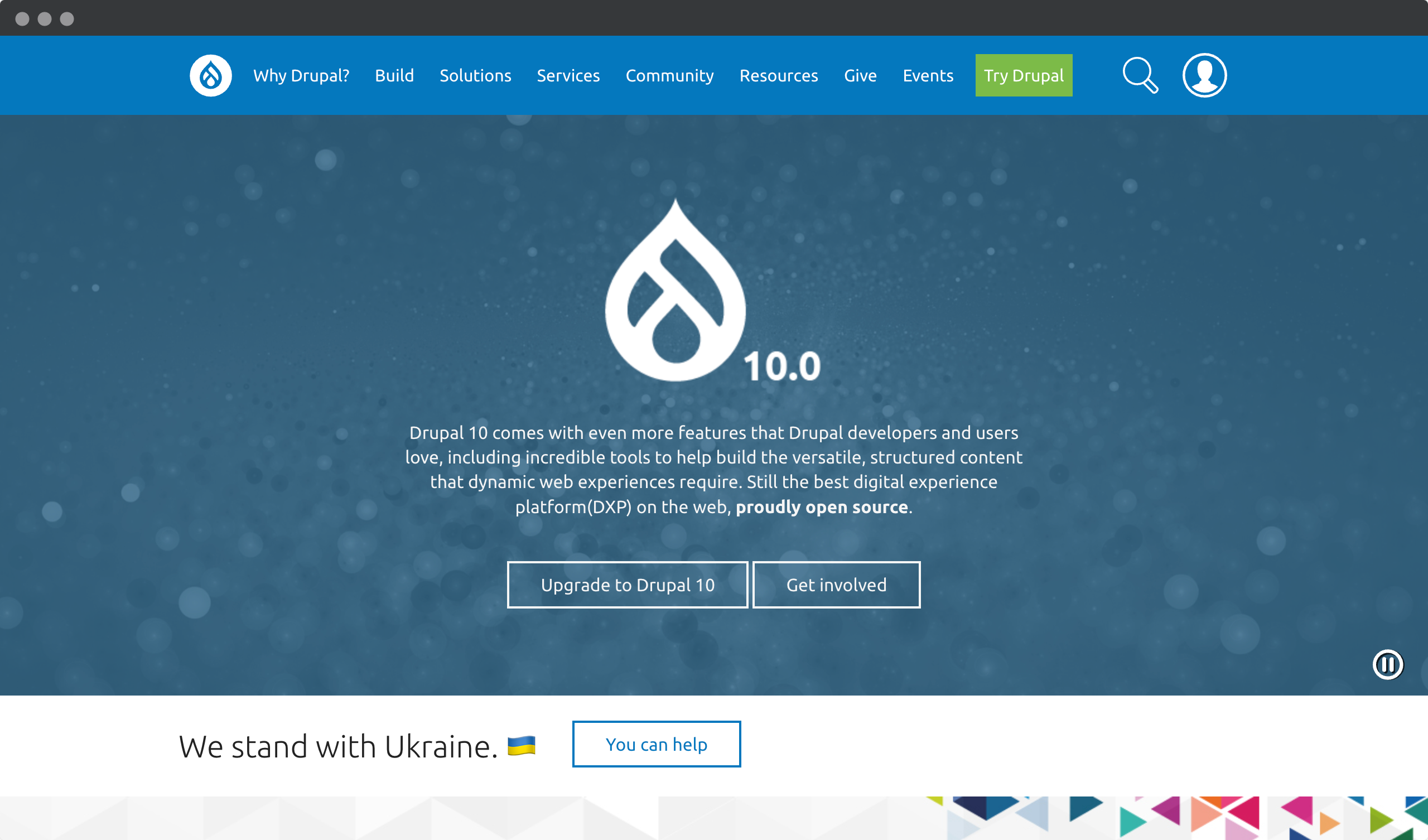
In addition to its scalability and customizable features, here are 4 key benefits of using Drupal
- It has great security measures that make it difficult for malicious users to gain access to sensitive information.
- Its interface is intuitive and easy to learn, even if you don’t have any programming experience.
- It provides detailed reports on site performance, so you can quickly identify areas that need improvement.
- Finally, it supports multiple languages, making it suitable for a global audience.
All in all, Drupal is packed with powerful features that give users complete control over their websites – making it one of the top contenders in terms of content management systems available today! Now let’s explore Joomla – another popular CMS option…
Joomla!
Joomla! may not be the first alternative that comes to mind when considering WordPress alternatives, but it is certainly worth considering. It has been around for more than a decade and has grown in popularity over the years as an open source content management system (CMS). Here are three reasons why Joomla stands out from other CMSs
- Robustness – The platform offers advanced features and capabilities such as multi-language support, customizable modules, themes and plugins. This makes it ideal for creating complex websites with ease.
- Flexibility – With its modular architecture, users have full control over the design and functionality of their website. They can also easily extend the platform’s capabilities as their needs evolve.
- Community Support – A thriving community of developers provides helpful resources such as tutorials, templates and extensions to help new users get up and running quickly.
The appeal of Joomla lies in its ability to provide webmasters with an intuitive interface coupled with powerful tools that enable them to create stunning sites without requiring any coding knowledge or experience.
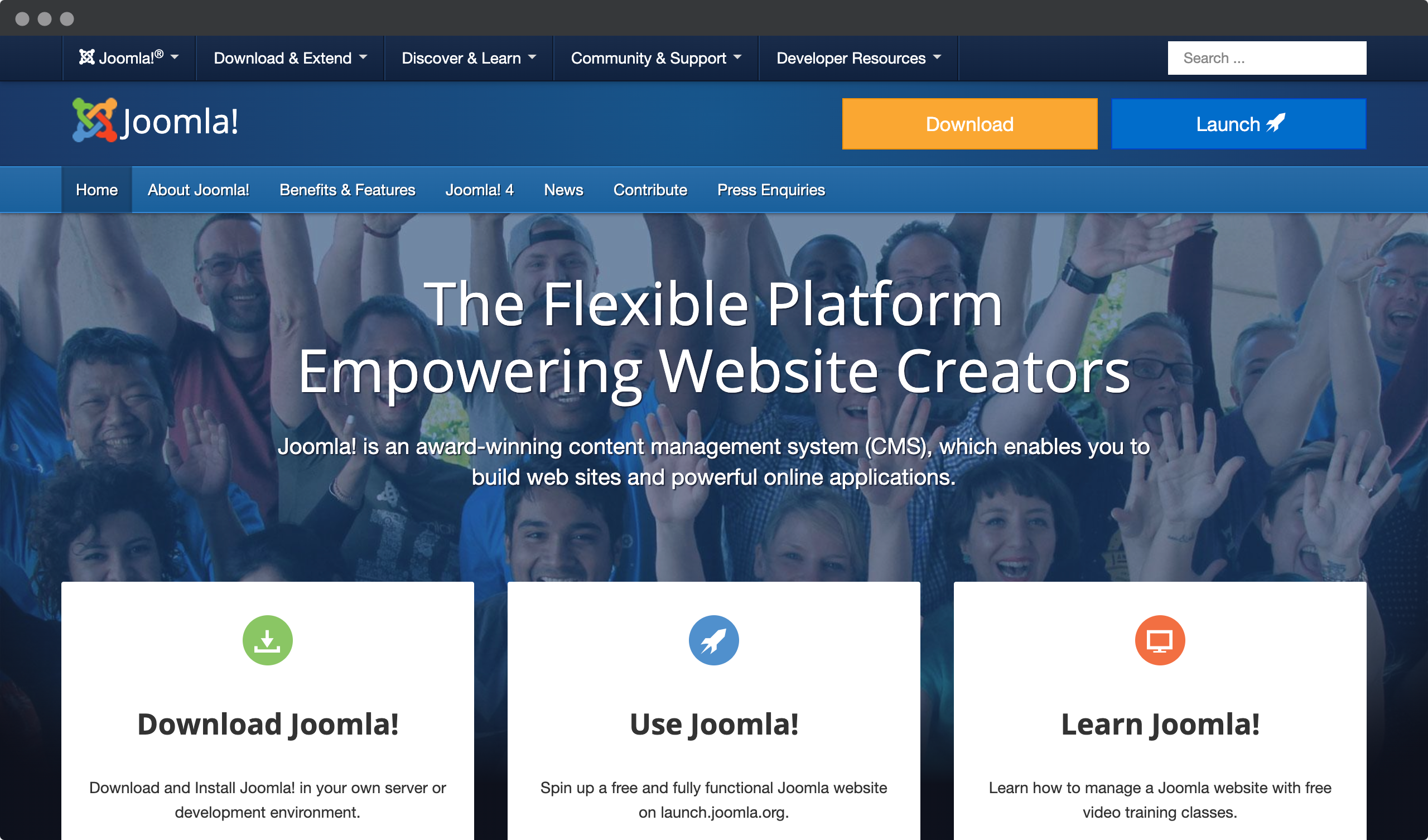
What’s more, Joomla is designed for scalability, which means that businesses can grow without worrying about whether their current site will be able to handle additional traffic or feature requests in the future. As such, this versatile software solution should definitely be on your list of top WordPress alternatives if you’re looking for something that offers flexibility, power, and reliability all at once. From here, we move on to Blogger – another popular choice among those looking for alternatives…
Blogger
Blogger is an excellent alternative to WordPress. It’s an intuitive, easy-to-use platform that allows you to create your own blog or website quickly and easily. With its simple drag-and-drop interface and templates that can be customized with themes and widgets, it’s no wonder Blogger is the first choice for many aspiring bloggers.
One of the best things about Blogger is that it’s free! You don’t have to pay a dime in hosting fees or other related costs; all you need is an Internet connection and some basic knowledge of web design principles. And if you want to get even more out of your blogging experience, there are plenty of paid add-ons available so you can customize your site exactly the way you want without breaking the bank.
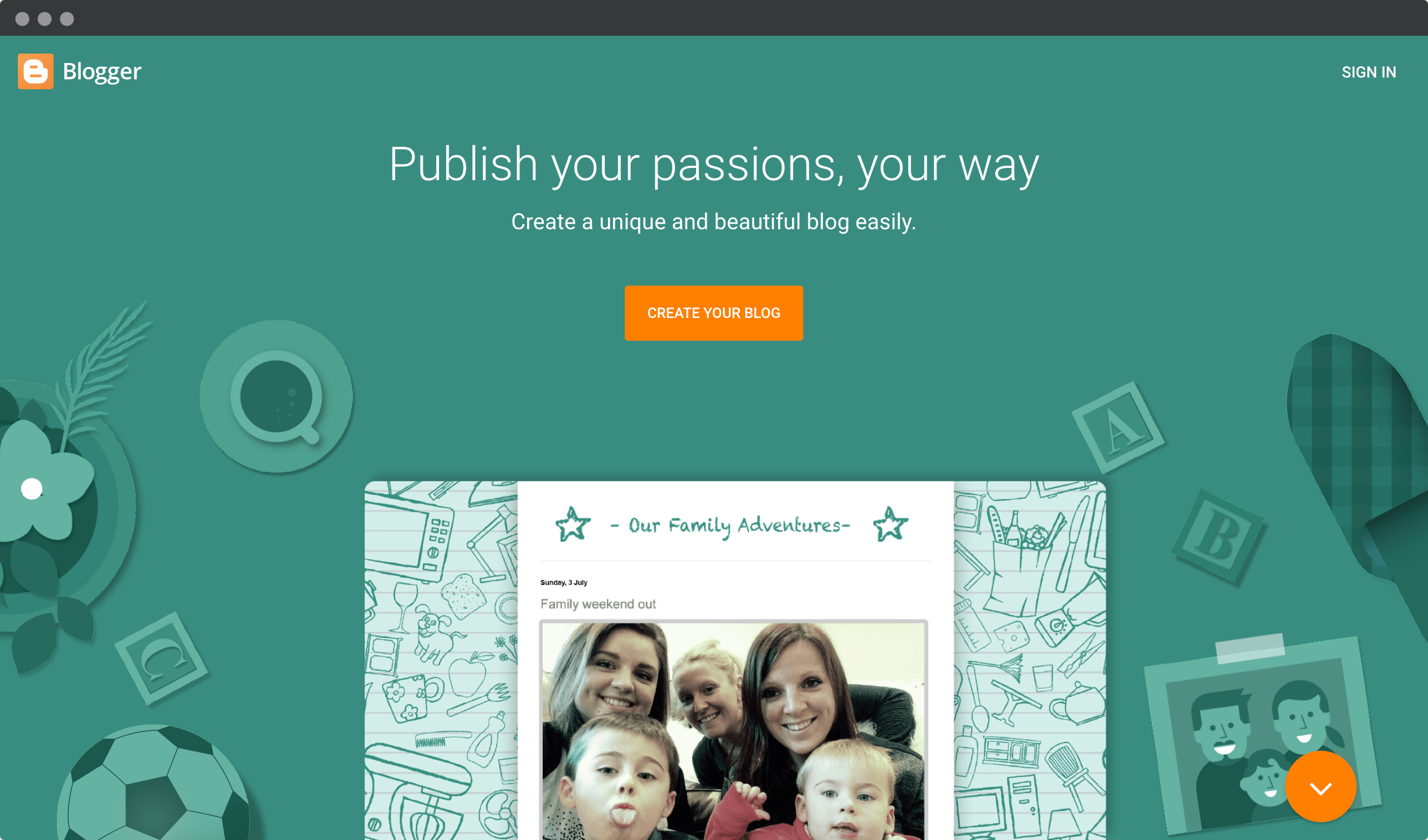
It doesn’t take long to get started with Blogger either: just sign up for an account, choose a template, customize it with the theme editor, and start typing! And getting feedback from visitors couldn’t be easier, thanks to the commenting and social media sharing options built right into the platform. All of these features make Blogger one of the most popular alternatives to WordPress today.
So whether you’re just starting out or want something easier than WordPress, give Blogger a try – it could be just what you’re looking for. Now let’s take a look at Ghost…
Ghost
Ghost is an increasingly popular blogging platform that has seen 500% growth in the last few years. This makes it one of the fastest growing alternatives to WordPress, with plenty of features for bloggers who want more control and customization over their content.
If you’re looking for ease of use without sacrificing functionality, Ghost may be right up your alley. It’s simple yet powerful interface allows anyone to set up a blog or website quickly and easily. Plus, all Ghost sites are built with SEO optimization out of the box – so there’s no need to worry about configuring plugins or settings every time you post something new!
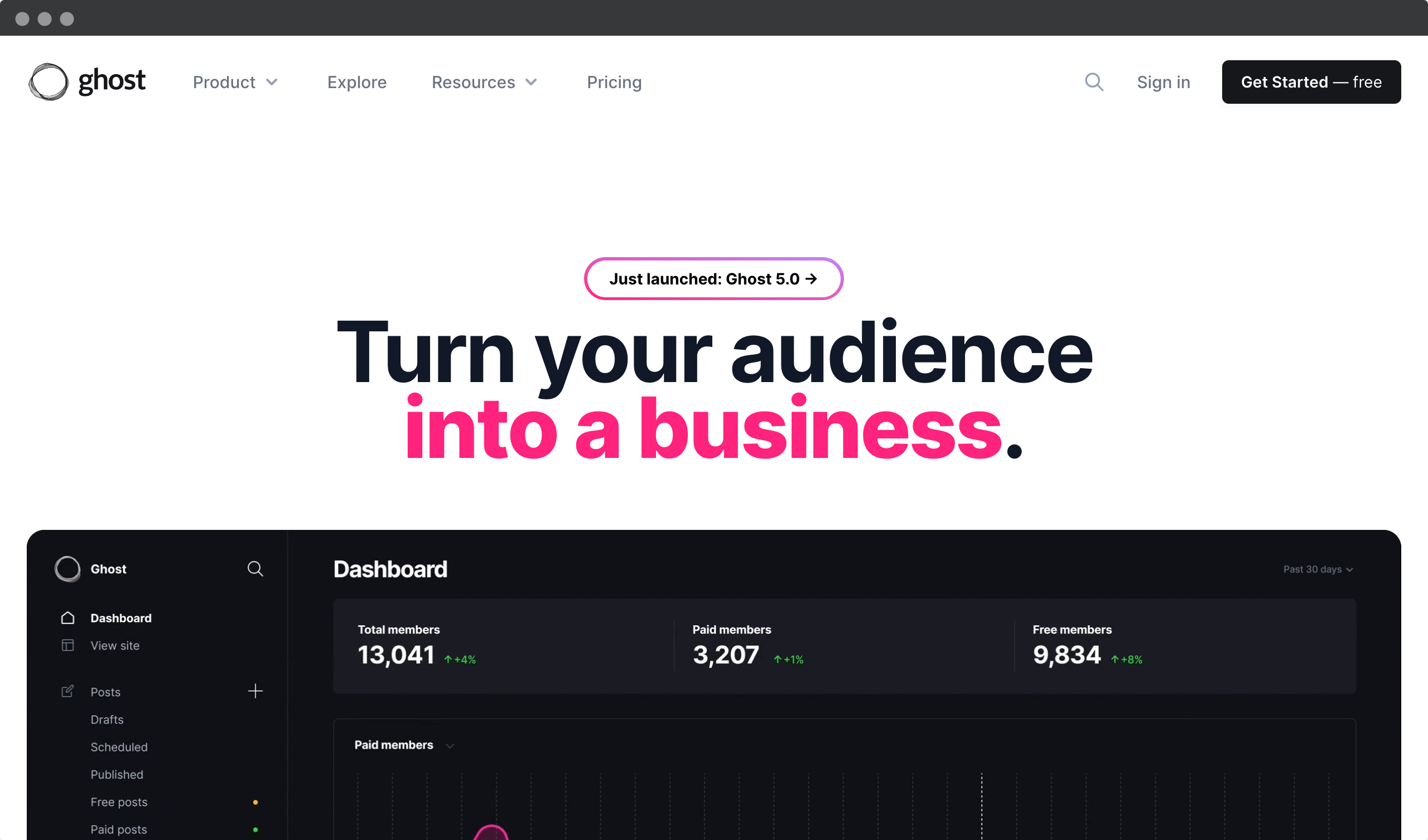
The best part? Ghost also offers developers tons of flexibility when it comes to customizing themes and code – making it perfect for those who want to take full advantage of its open source capabilities. So if you’re looking for an alternative to WordPress that’s fast, easy and customizable, give Ghost a try. From its impressive feature list to its intuitive design, it might just be what you’ve been looking for. And while you explore other options like Gatsby…
Gatsby
Gatsby is a modern website development framework built with React and powered by GraphQL. It provides developers with an intuitive, accessible tool for building websites quickly and easily. Gatsby does more than just generate static HTML files; it allows you to create dynamic websites using its powerful data layer capabilities.
One of the benefits of using Gatsby is its focus on performance optimization. The framework helps reduce page load times by pre-building pages at build time so that they can be served lightning fast when requested. In addition, Gatsby’s plugins provide access to many popular third-party services such as analytics tracking or content delivery networks (CDN). This means you can integrate these tools into your site without writing any code!
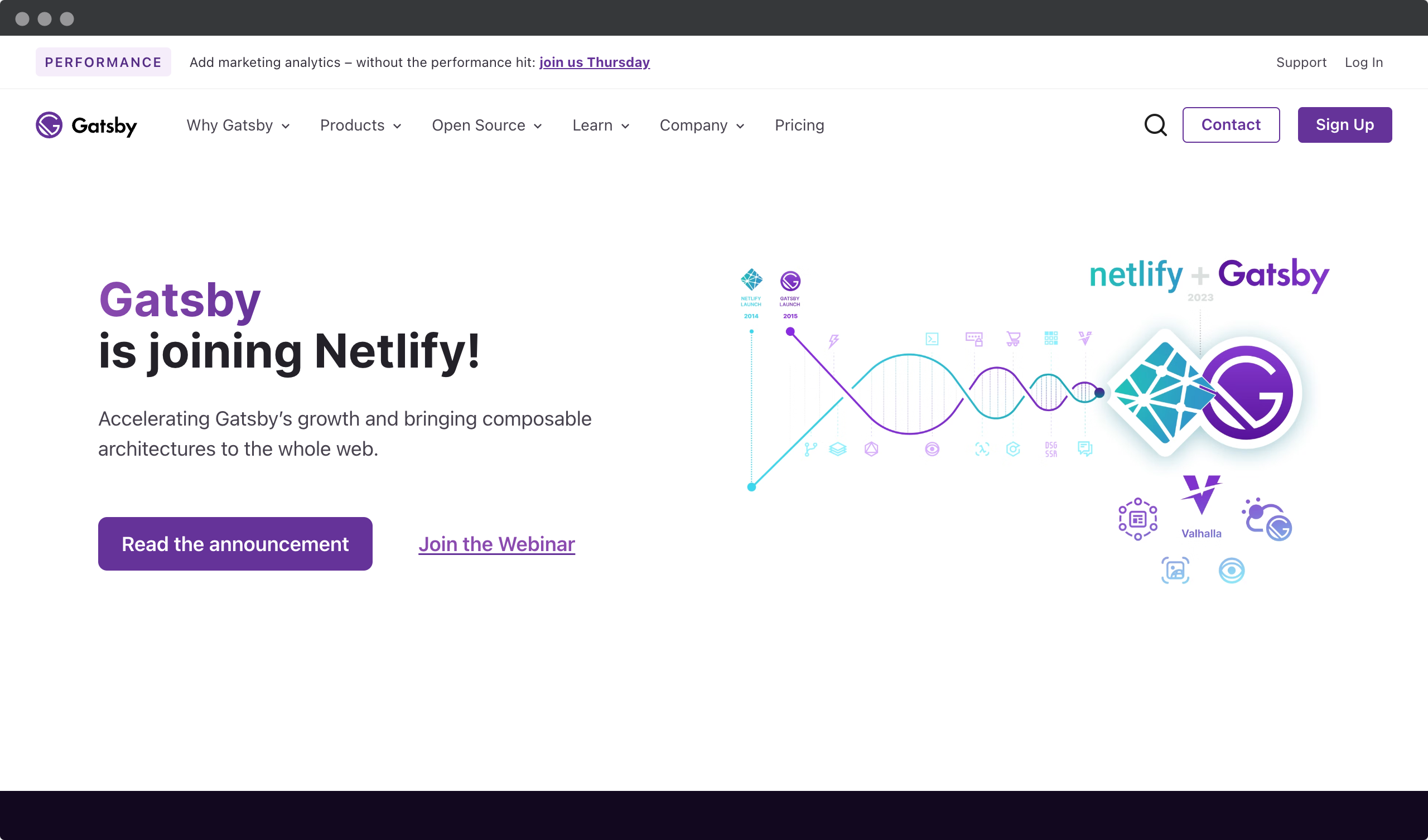
Another great feature of Gatsby is its integration with traditional CMS systems like WordPress or Drupal. You can use them to manage the content of your site while still taking advantage of all the features that come with Gatsby – allowing you to have both a robust frontend and backend in one package.
TIP: Taking full advantage of Gatsby’s power requires some technical knowledge, but don’t let that stop you from giving it a try! If you’re looking for an alternative to WordPress, give Gatsby a try – who knows what amazing things you might discover?
From there, we move on to ‘Hugo’, another popular option for building websites…
Hugo
Hugo is a powerful open source static website generator that provides an alternative to WordPress. It’s built for speed and performance, making it perfect for developers who want to build lightning-fast websites without compromising on quality.
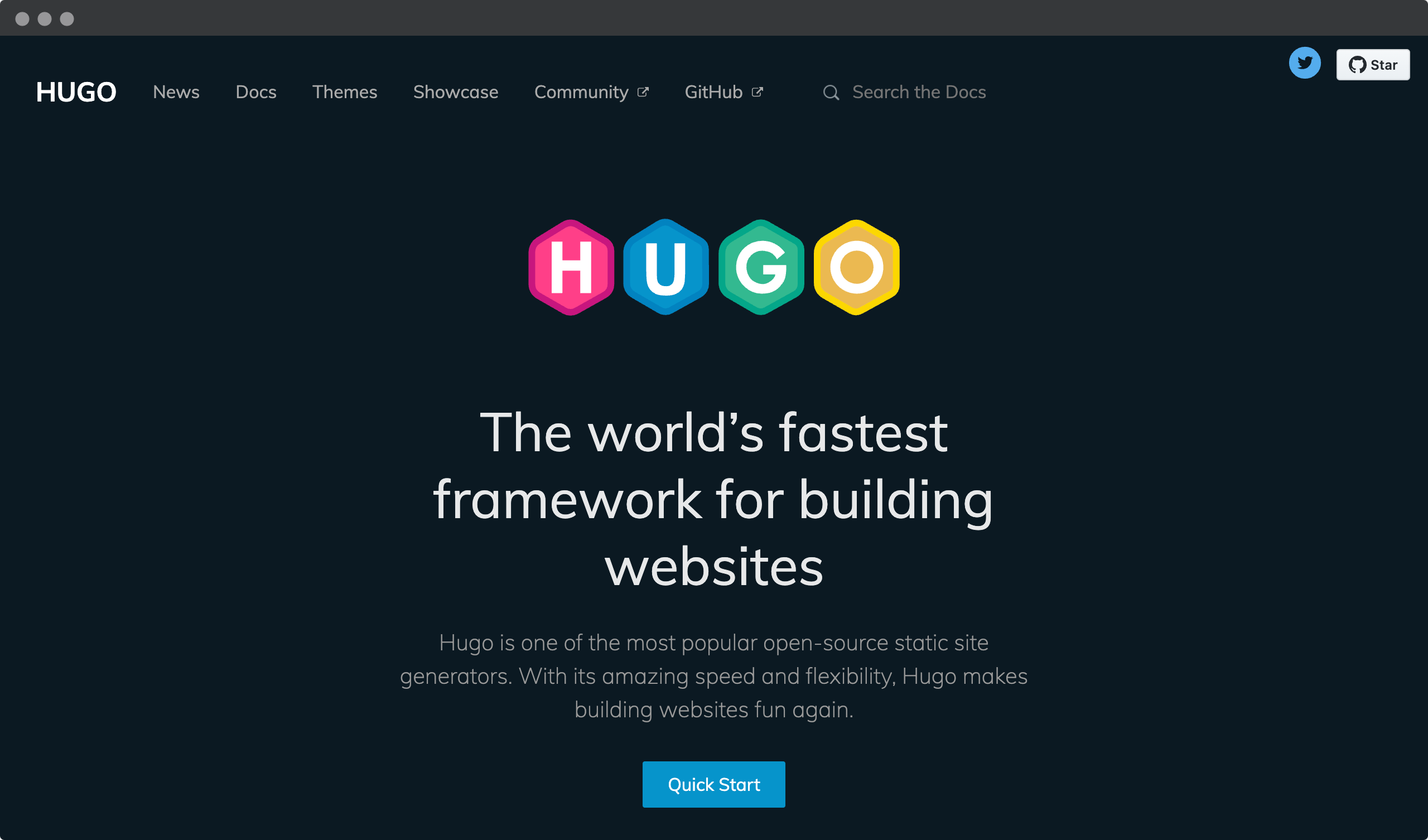
Here are just four of the many advantages Hugo has over WordPress:
- Faster setup time – With Hugo, you can have your site up and running in no time. Its easy-to-use templating system makes creating custom themes or choosing from existing ones quick and easy.
- Improved security – Since Hugo sites don’t rely on databases like WordPress, there’s less chance of hackers getting in by exploiting vulnerabilities in the database layer. And because Hugo uses plain text files as content sources, you don’t have to worry about malicious code being injected into your site by third parties.
- Customization Flexibility – By taking advantage of its built-in templating engine and command-line interface (CLI), you can easily customize your Hugo site however you like with just a few lines of code – no need to mess around with bulky plugins or frameworks!
- Cost Savings – Finally, using Hugo instead of WordPress could save you money in the long run, as hosting fees tend to be much lower due to its lightweight nature compared to other CMSs.
All of these features make Hugo an attractive choice for those who want more control over their website development process while still having access to modern tools and features. Moving away from traditional web technologies like WordPress doesn’t have to be complicated or expensive; with Hugo, it’s easier than ever. Let’s take a look at how Craft CMS stacks up against these alternatives.
Craft CMS
Craft CMS is one of the most popular content management systems for websites, with over 300,000 sites using it. That’s an impressive statistic that helps to convey just how powerful this system can be!
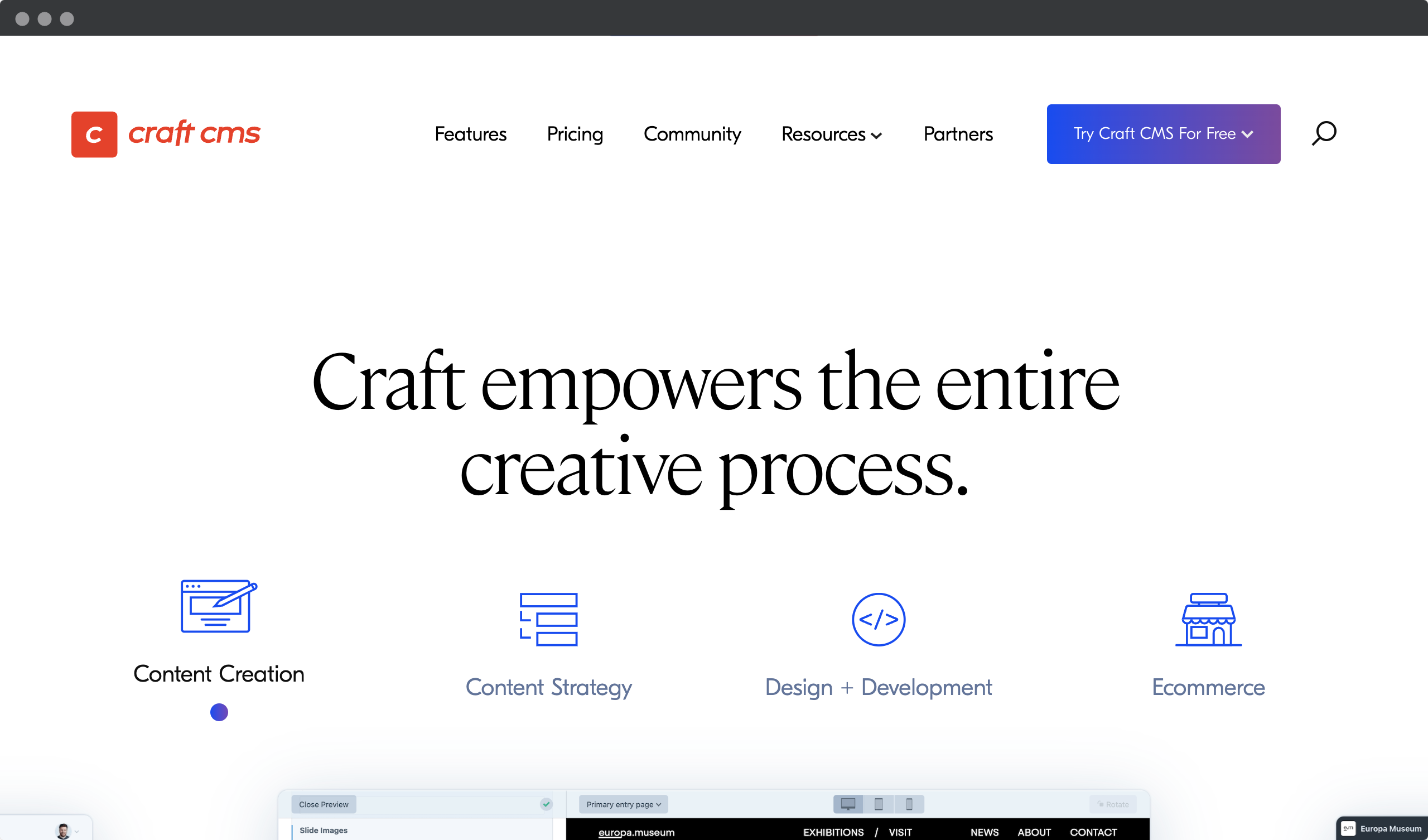
The great thing about Craft CMS is its ease of use: you don’t need a degree in web development to get started. Its drag-and-drop interface allows anyone to quickly create a website from scratch. Here are some other features that make Craft CMS stand out:
- An intuitive control panel
- A variety of templates and plugins
- Easy integration with third party services
- Flexible customization options
All of these features combine to give users complete creative freedom when building their site – perfect for those who want to create something truly unique.
Craft CMS also offers excellent customer support if you ever run into problems or have questions while building your site. From online tutorials to email support, they provide everything you could possibly need. This makes getting your new website up and running as easy as possible. Plus, its scalability ensures that no matter how big your project gets, Craft CMS will keep up with the demands of your audience – so you’ll never have to worry about crashing under the pressure.
Moving forward… Adobe Dreamweaver is another viable option to consider when looking for WordPress alternatives.
Adobe Dreamweaver
Looking for an alternative to WordPress? Adobe Dreamweaver could be the perfect solution. It’s a powerful web development tool with several features that set it apart from the competition.

Let’s take a closer look at what this platform has to offer:
- Easy-to-use interface – You don’t have to worry about having technical expertise or programming skills to use Adobe Dreamweaver; its interface is designed to be intuitive and easy to use, even for first-time users.
- Advanced design capabilities – When you’re creating a website, you want every element of your design to be optimized for performance. With Adobe Dreamweaver, you can do just that by taking advantage of advanced design features that let you create stunning visuals without compromising speed or responsiveness.
- Automated code refactoring – The code refactoring feature in Adobe Dreamweaver helps streamline your workflow by automatically restructuring and organizing HTML and CSS code as you work. This ensures that your pages load faster than ever while maintaining their visual appeal.
- SEO tools – Last but not least, Adobe Dreamweaver offers several tools to help you optimize your website content for search engines such as Google and Bing so that more people can easily find your website online.
Adobe Dreamweaver provides all the necessary tools to create beautiful websites with ease and efficiency, making it an ideal alternative to WordPress for anyone who wants a reliable yet innovative web development experience!
Conclusion
It is clear that WordPress offers a great platform for creating websites, but it is not the only option. Many alternatives exist, each with its own advantages and disadvantages. Whether you’re looking to save money or simply want more control over your website’s design, there are plenty of viable options out there.
By researching different WordPress alternatives, you will find one that is perfect fit. So when faced with the decision of which platform to use for your website building needs, consider all of your options carefully. Do some research and find the best fit for your budget and skillset. You may be surprised at how much value an alternative can offer in comparison to WordPress. Like finding buried treasure, these alternatives could just be gems waiting to be discovered by those willing to take a chance on something new!
Frequently asked questions
How much does each WordPress alternative cost?
The idea that there are viable WordPress alternatives is gaining momentum. But how much do they cost? To better understand, let’s explore the different options available and their associated costs.
The truth is, many website building platforms have made it possible for users to easily create a website without knowing any code! This means that you can save time, money and resources by not having to hire a web developer or learn HTML/CSS coding yourself.
Many of these platforms offer free plans so you can get started with minimal investment. Examples include Wix, Weebly, Squarespace, and Strikingly – all of which offer templates that allow you to customize the look and feel of your site without having to write any code.
However, if you want more advanced features such as e-commerce integration or custom domains, you may need to invest in one of the premium subscription plans offered by these providers – typically ranging from $5-$50 per month, depending on the plan chosen.
In addition, some open source content management systems (CMS) such as Joomla and Drupal also exist as alternatives to WordPress, but they require developers who know how to set them up and configure them properly in order to function properly. Similarly, WordPress hosts such as SiteGround or WP Engine offer managed hosting services starting at around $30-50 per month for basic plans.
So if you are considering building a website using an alternative platform instead of WordPress, be sure to consider both the initial setup costs as well as the ongoing maintenance fees before making a choice – finding out after the fact could end up costing you more than you anticipated in terms of both time and money invested!
What is the learning curve for using WordPress alternatives?
For many, the thought of switching to a WordPress alternative can be daunting. After all, it’s important to know how easy or difficult it is to learn and use – especially if you’re starting from scratch. So when considering your options, ask yourself: what is the learning curve for using WordPress alternatives?
The answer depends on the platform you choose, but some are easier than others. For example, platforms like Wix have well-designed tutorials that make getting started almost effortless. On the other hand, more robust solutions like Drupal require a moderate amount of technical knowledge before diving in head first.
If you find yourself stuck and have no idea where to start, there are plenty of resources available online. From step-by-step guides to video tutorials to forums, there is a wealth of helpful information no matter your skill level. And don’t forget to check out support communities-these groups offer valuable insight into troubleshooting and best practices for any type of technology.
TIP: Before committing to one solution over another, read user reviews and compare features to get a sense of which platform is a better fit for your needs. Doing this research up front will save you time (and money!) down the road!
Are WordPress alternatives secure?
Are WordPress alternatives secure? When it comes to website security, you want the best for your business. Fortunately, there are a number of reliable options that offer top-notch protection. Here’s what you need to know:
1. Most WordPress alternatives use encryption technology and other cybersecurity measures to protect user data from hackers and malicious software. This means that any information stored on your site is safe and secure. Plus, many of these solutions have built-in features like two-factor authentication or login notifications, so you can be sure that only authorized users have access to sensitive data.
2. In addition, most WordPress alternative platforms provide regular updates and patches to ensure that their sites stay current with emerging threats. They also tend to implement efficient backup systems in case something goes wrong – giving you added peace of mind that all of your important files are safely backed up at all times.
3. Finally, if you’re looking for a more tailored approach to website security, some WordPress alternatives allow you to customize the level of protection by setting specific rules and protocols according to your needs. So no matter how complex or simple your requirements, chances are there’s an option out there that can meet them perfectly!
In short, when it comes to finding a secure solution for hosting your website, look no further than the various WordPress alternatives available today. With robust protection against potential threats and customizable features designed specifically for businesses like yours, investing in one could prove invaluable in protecting your digital presence now and in the future.
What are the differences in design capabilities between WordPress and its alternatives?
It’s no secret that WordPress is the platform of choice for many website designers. But what if you’re looking to branch out and explore other options? What kind of differences in design capabilities can we expect from alternatives to WordPress?
The truth is, a lot depends on which specific alternative you choose, as they all have their own unique strengths and weaknesses. Some are better suited for simple sites, while others offer more complex toolsets.
If your goal is to create something visually stunning with lots of interactive elements, you may want to look into one of the more advanced options like Wix or Squarespace. These platforms offer powerful editing tools that allow users to customize nearly every aspect of their site without any coding knowledge. However, some lack features like plugins or e-commerce integration compared to WordPress.
On the other hand, if simplicity is key for your project, there are plenty of lightweight solutions like Weebly or Jimdo. These services make it easy for even beginners to build functional websites quickly by providing templates and drag-and-drop editors. While these types of platforms may be limited in terms of design customization, they’re ideal choices when speed and ease of use take precedence over aesthetics or functionality.
Whether you’re just starting out in web design or you’re an experienced developer looking for new challenges, exploring different platforms will help you expand your skill set and open up opportunities to create truly remarkable projects that stand out from the crowd!
Is there a way to transfer content from q WordPress site to an alternative platform?
It’s no secret that WordPress is one of the most popular content management systems out there. But if you’re looking to make the switch, how do you go about transferring your existing content? That’s where we come in!
The process can be surprisingly simple and straightforward, depending on the platform you choose. Many alternatives offer options to import data from WordPress sites with just a few clicks. This makes it quick and easy to get up and running without any additional hassle or headaches.
However, it’s important to note that some platforms may not support certain features or formats, so it’s best to do your research before making the switch. In addition, there are third-party services that allow users to import their data with ease – so no matter which route you take, it shouldn’t be too difficult to transfer all of your hard work into something new.
There’s no need for uncertainty here – moving away from WordPress doesn’t have to be complicated or intimidating. With some careful thought and planning, moving your digital presence to an alternative platform can give you the fresh start you’ve been looking for!